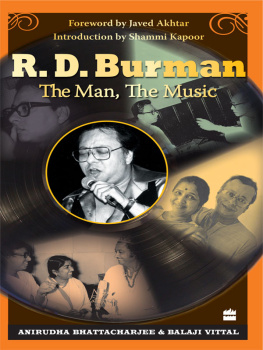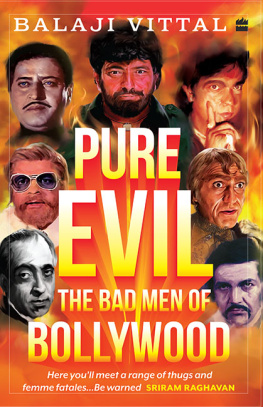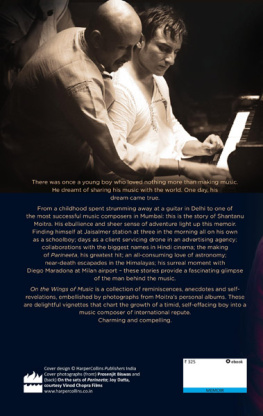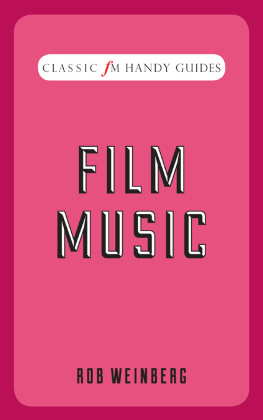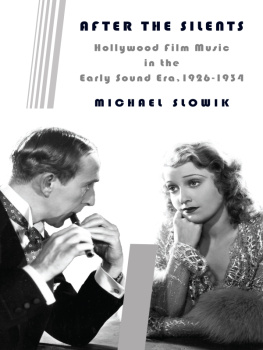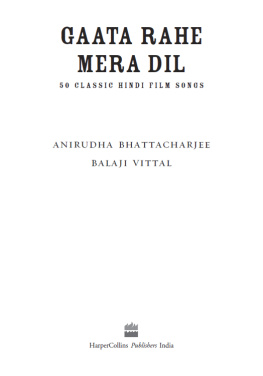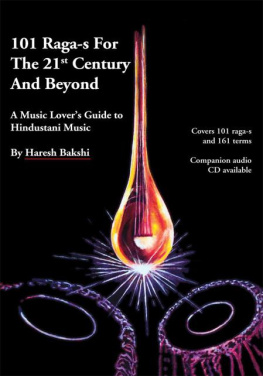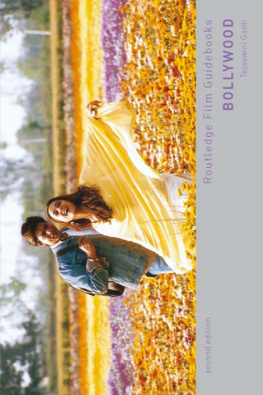
R.D. BURMAN
The Man, The Music
Anirudha Bhattacharjee
Balaji Vittal

To Basudev Chakravarty, Manohari Singh, Maruti Rao Keer and R.D. Burman
Were sure they are sitting together somewhere composing music
Table of Contents
At the outset, I would like to thank Balaji Vittal and Anirudha Bhattacharjee for this endeavour. Im afraid, more often than not, an artistes persona and the nuances of his work get lost in the fog of time because as a nation we are poor at keeping records. I think this kind of history is precious, important for coming generations. Today, when someone decides to make a documentary on a great film-maker like Bimal Roy, there are hardly any people around who have had first-hand experience of working with him. In the course of their work, these masters often say and do things off the cuff, almost casually at times, which offer an insight into their minds and their crafts. These pearls of wisdom need to be documented, preserved and handed over to the next generation. But more often than not, these get lost. It is desirable and imperative that we talk to people who have worked with these masters, who know how they functioned, who understood the basic texture of their personality, what it was that made them what they were. That is how we can relate their art to them and them to their art. It makes me happy that in this book the authors have given space to the people who were fortunate enough to work with this maestro called R.D. Burman. They have made the effort to go beyond the songs, talked to people who were present when the songs were being composed and recorded. And in the process they have given us a wonderful account of the work of a genius.
What can I say about R.D. Burman? Some people become successful at a given point in time. And as time passes, vogues and fashion and styles change, these people either die or wither away and new people come. The only ones we remember are those who were not just successful, but who did something unprecedented; who took their art to a whole new level and whose contribution changed their field of craft for coming generations. RD introduced a new sound, with a new sensibility, new beats, new ways of using existing instruments, and brought new musical instruments too. The technical facilities we take for granted today were not available in the 1960s or 70s. Yet Panchams music remains as fresh, it sounds as contemporary as it did three decades ago. And he had the genius to create sounds out of everyday things, for example, placing something in front of a big fan and recording. It was a strange, yet unforgettable experience seeing him at work.
His compositions in films like Chhote Nawab and Teesri Manzil were unprecedented. Those songs did not remind you of the songs of yesteryears. I think it took a little time for Indian listeners to get attuned to the new music. But once it took hold of the listeners attention or aesthetics, it remained there. That is why contemporaries of RD, who were no less successful if not more, are not remembered today with the kind of reverence that you see for RD. New musicians like ShankarEhsaanLoy or VishalShekhar have great respect for RD, and you can see that in their work they take his tradition forward. Obviously, they are no less talented; they are adding things to his legacy, they are updating, but somewhere you can see that it is the same chain of aesthetics, of musical sensibility that is being carried forward by the next generation.
I have been very fortunate, and I am very proud of the fact that I had a long association with him. My first film with Pancham was Saagar and the very first song that we recorded together was Jaane do na . I remember I was writing the dialogues for Saagar at a hotel in Khandala and I had to come back to Bombay to attend a music sitting for a particular situation in the film. He had given me the tune. I tried to write the song to that tune and there was a particular line that I was very keen to bring into the song, but the metre was not allowing me. So I put the tune aside and wrote the song on my own. From Khandala I went directly to his music room, where Ramesh Sippy and others were waiting for me, and I said, I have written the song, but please dont get upset I have not written the song to the tune you gave me because whatever I wanted to say was not fitting the metre. So RD said, Okay, let me write down the song. He took a pen and paper, and I started dictating the song. By the time he finished, in some part of his brain he had already made the tune while jotting down the song! As soon as he finished writing the last word, he opened the harmonium and started singing. That is how Chehra hai ya chand khila hai was born.
After that we did quite a few films, and there came a time when I suppose in this film market and in the commercial market of music, people dont appreciate your talent; people appreciate your last films success; thats about all. And, unfortunately, some of his films did not do well in spite of his good work. Then, perhaps, failure may have disenchanted him; it may have affected his work for a while too. There came a time when the closest of his close colleagues dropped him; he had no work. Maybe because his films were not doing well, things were not going right. Perhaps he did not concentrate the way he should have on the quality of his work; after all, he was a human being. But instead of inspiring him, instead of cajoling him to the standards he was capable of, his associates preferred to move away. But my faith in him never wavered. I was convinced he was a genius; one didnt have to be a Sherlock Holmes to see that.
We did some films at that time, like Gardish, Gang , one film by Ram Gopal Varma, Drohi , if I am not mistaken, and 1942: A Love Story . These were his last films. I have been an admirer and I had unshakeable faith in his talent. Everyone goes through a lean patch and I knew that it was only a matter of time. With 1942 he knew it was now or never, and he had to prove to the world that he was R.D. Burman.
I remember, one evening I went to his music studio and he was sitting alone. He had his headphones on and was listening to something. He gave the headphones to me and said, I have dubbed Kumar Sanu once again for Kuch na kaho . Listen to it now. Then he played the song for me which all of us listen to now. And I could see that he was confident; there was a kind of amused expression on his face and he said, Yeh music release hone do. It did, and obviously it was a major hit; it became a milestone, but he was not there to see this.
Most of his tunes that you appreciate, like Ek ladki ko dekha , were created in five to six minutes. That was the level of his creativity, the energy he had. Today, modernity and dignity have become an either/or matter, you are either modern or you are dignified. Its a bad choice! But you dont have that in RDs music. His music is modern, cool and has a certain dignity; theres nothing cheap about it. It is sophisticated. You dont feel that this sound belongs to an uncouth person; there is something very decent about his compositions. And this combination of modernity and dignity has become very rare.
He was a master with background music too; he knew the role it plays in cinema. One has to just think back on the awesome background score of Sholay , with its many elements, to realize how developed his sensibilities were as far as sound was concerned. It makes me immensely happy to note that the authors mention this in quite some detail. Although some of the background and interlude pieces of ShankarJaikshan are well known and you can recognize them in an instant, I feel that till RD came along, sound was not as important as the composition as far as musicians were concerned. RD gave equal importance to sound. He paid equal attention to his orchestration, whether it was background music or during the song.
Next page
